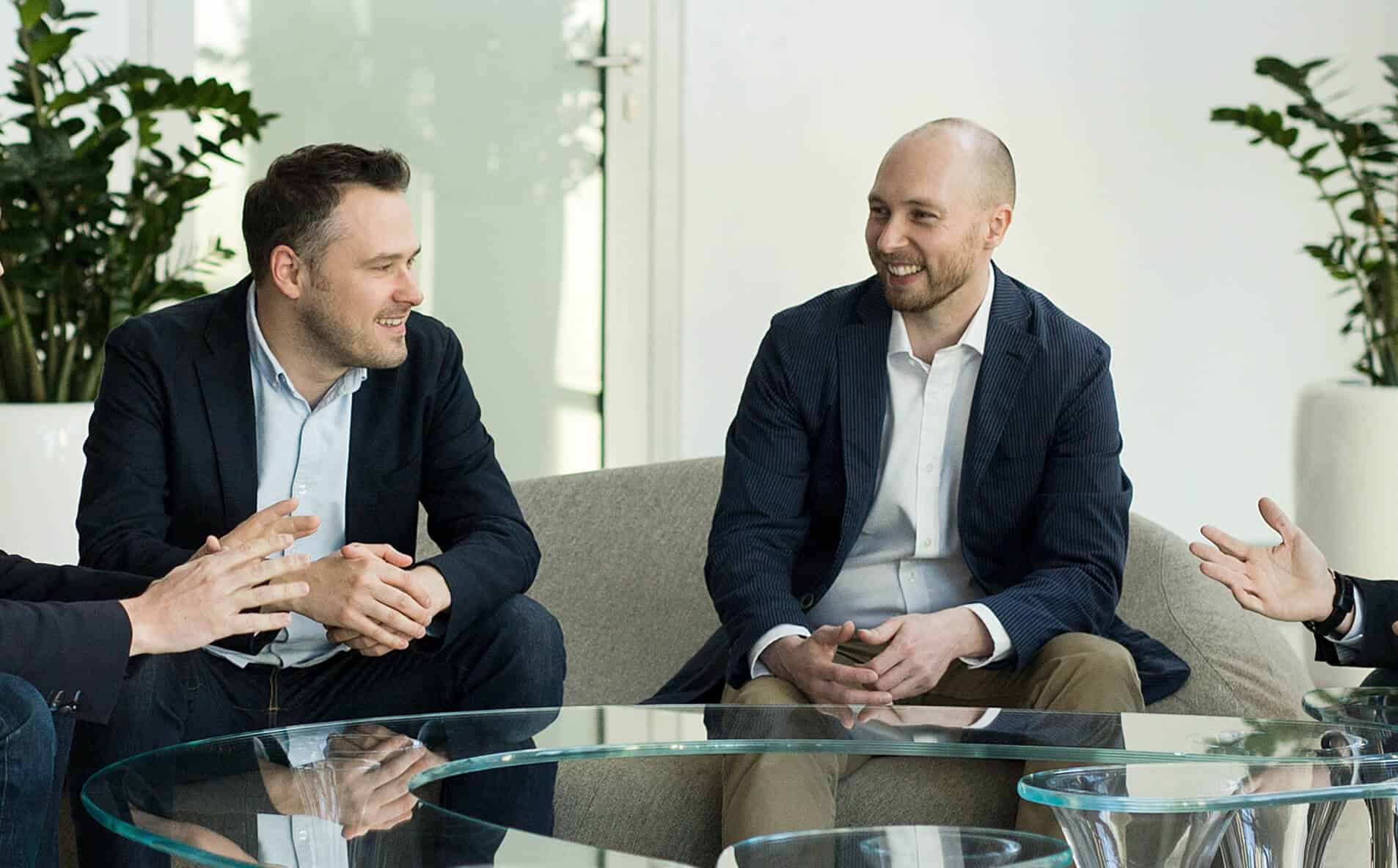We’re moving forward with the webstore service that we launched earlier this year! Over 18,000 eBay and Amazon sellers have already been trading internationally with us and now also webstore owners can localise their stores on foreign marketplaces, including Australia, France, Germany, Ireland, Italy, Spain, United Kingdom, and the United States. The number of sellers interested in the localisation of their online shops is constantly growing. Currently it is of utmost priority for us to improve the shopping experience in localised shops.
A short Q & A session about the development of the webstore product has been arranged with Andre Borgstrom and Fitch Richardson, the Webstore Product owners at Glopal .

eBay and Amazon constitute a big part of the global online sales landscape, but, surprisingly, only 25% of sales happen on marketplaces. 75% of sales take place via webstores. That is why, it is crucial to facilitate the internationalisation process for all webstore owners wishing to reach wider audiences. We want every seller to be able to start international sales with just a few clicks, not only on eBay and Amazon, but also with their own webstores.
We make sure that localised websites are found by foreign buyers. This happens via multiple marketing channels, e.g. search engines, social networks, email marketing, or partner referrals. It is essential that products are promoted in a way that fits local markets.
We’re currently offering this service on 6 foreign markets. Translation is of human quality. The service is available for webstores that use Magento, WooCommerce, OpenCart, PrestaShop, osCommerce and Zen Cart.
To better understand the internationalisation process of webstores, we have talked to experts: Andre Borgstrom and Fitch Richardson, the pioneers in this field.
Interview with Andre Borgstrom and Fitch Richardson
Why do you think it is important to start selling globally with your online shop?

Andre Borgstrom, Webstore Product Owner
Andre: Globally the number of online shoppers is growing every year. According to Statista, the expected number of shoppers in 2016 is 41 million in the United Kingdom, 46 million in Germany, and 175 million in the USA. We know that pioneers in online retail such as Amazon and eBay have successfully expanded their online businesses globally over the past 20 years. Yet more recently, also retailers who have invested in localising their online shops have shown that it has been a successful strategy, including ASOS, iHerb, and Zalando.
We are now at a point at which the technology required to sell globally using your own brand is available and affordable for everyone. I think this is a great opportunity for retailers of any size to take advantage of this and grow their businesses online.
What do you mean by localisation?
Andre: Let’s say that you’re a UK seller and you want to sell in France. It may seem that translating your site into French will do the job and attract thousands of new French customers. In reality, however, it’s only part of the story. To appeal to international audiences, not only do you need translation, but full localisation of your store. That includes translation, currency conversion, size conversion, calculation of local taxes and duties, low international shipping rates, and customer service for foreign buyers.
On top of that, you must promote your store abroad using various marketing channels to get spotted. As you can tell, it is more complex than just translation and shipping items abroad. According to IMRG, localisation in a particular country, compared to merely shipping an item there, is likely to give you a 91% increase in online sales.
We are now at a point at which the technology required to sell globally using your own brand is available and affordable for everyone.
What if the website is in English? Surely, the buyer of today speaks English – would it not be a big saving for the seller if they used English as the first language on their localised websites?
Fitch: Providing a website in English only is a lot easier for retailers, but to not make the effort to localise is a real false economy. In the UK most online retailers make some effort to accommodate international buyers through local landing pages and international shipping options. As a consequence, many see between 10% and 20% of their orders coming from abroad.

Fitch Richardson, Product Design Manager, Glopal
This is great, but in terms of the growth potential that cross-border trade offers, this is just the very tip of the iceberg. The UK makes up less than 10% of the current global eCommerce market. This means that a UK retailer that is truly capitalising on the cross-border opportunity should see more like 80% of their orders coming from abroad and just 20% domestically.
A great example of a UK retailer that has done really well at capturing this opportunity is ASOS. Today they can hardly be called a UK business any longer, they are truly a global business with over 60% of their business coming from abroad. They achieved this through offering a fully localised buying experience to their key international markets.
So it all comes down to localisation?
Fitch: The more competitive your market, the more important it is to localise. If your buyers have the option to buy a similar product from a local competitor in their own language, own currency and with payment and shipping methods that are familiar to them, they are likely to do so even if your product is cheaper. Localisation is about communication, but it’s also about giving buyers confidence in your product and business.
An area which is often neglected in the cross-border debate is visibility. So often we focus our conversations on converting international buyers, which is clearly the ultimate goal, but any website owner will tell you that having a good high performing website is just one part of building a successful online presence.
The biggest challenge is visibility and driving quality traffic through marketing and SEO. If you do not localise your store for international visitors you will not gain vital SEO ranking in your target market and it will also make online marketing costly and inefficient. Localisation is key to success internationally.
Localisation is about communication, but it’s also about giving buyers confidence in your product and business.
How can sellers sign up for your service?
Andre: You can sign up on our website.
The process itself is easy: a plugin is installed on the seller’s shop which enables us to copy and synchronise product information such as descriptions, images, stock levels, and prices. We start with 100 of their top-selling products. We then build new localised versions of the seller’s site and publish and market the products worldwide under the seller’s brand.
The process itself is easy: we synchronise product information such as descriptions, images, stock levels, and prices.
What improvements have you made since you launched Webstores earlier this year?
Fitch: Our initial focus started at the bottom of the buying funnel, creating a local webstore that converted buyers and sold product. Then we focussed on building traffic and visibility for those stores so that our retailers were not only better converting their existing international buyers, but also attracting more international buyers.
Our focus now is to support more markets and more retailers. Initially, we concentrated on retailers running Magento stores, which has been a huge success. Now we’re looking to open this opportunity to as many retailers as possible through delivering extensions and plugins for over 30 of the most popular eCommerce platforms, including Shopify, BigCommerce and WooCommerce. Our mission has always been clear: To democratise international eCommerce and to make it accessible to all, not just the biggest players.
Our mission has always been clear: to democratise international eCommerce and to make it accessible to all, not just the biggest players.
What are your current priorities?
Andre: We’re currently working towards speeding up our onboarding process: we want new sellers to be able to use our service within the same day of signing up. We’re also planning to launch a mobile app that will provide buyers with an improved mobile shopping experience.
Additionally, we are working on a new feature that will enable sellers to display localised content inside their existing shop. In short, our goals are to boost our sellers’ sales figures and provide international buyers with an excellent shopping experience.
On a final note, what, would you say, are the pros and cons of testing the webstore solution?
Andre: We’ve been talking about the benefits quite a lot so at this point I’d like to say that there is no binding contract commitment on the seller’s part. There is no upfront setup fee and no insertion fees. All our sellers get free translation, free hosting, and free marketing during the 60-day trial period. We’re confident that our solution works for most sellers, and for those for whom it doesn’t, there is the option to cancel at any time free of charge. In the end, we want all sellers to succeed and grow their sales internationally and I invite them to give us a try.
Fitch: Honestly, the biggest risk is not trying. The growth opportunity that cross-border trade offers is unparalleled and there is no other marketing or growth strategy that comes close to the same potential for growth. To become a global player like Asos, it will require some investment and some process change, but this is not something you need to do upfront. Instead you can simply start with the setup you have and prove the market.
Your product won’t necessarily work in every market, so the best thing to do is start selling, see which markets take off and then concentrate on those. If you do it that way round, you then have a business case and mandate to make any process change or make any necessary investment. By the same token, you’ve also mitigated the risk because you’ve already proven the opportunity. Today there really is no reason why every online business should not be a global business.







